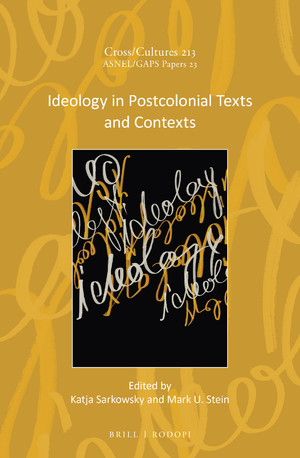
Ideology in Postcolonial Texts and Contexts.
ASNEL/GAPS Papers 23.
Sarkowsky, Katja and Mark U. Stein (eds.)
Brill Rodopi, Boston/Leiden, 2021.
Ideology in Postcolonial Texts and Contexts reflects that critiques of ideological formations occur within intersecting social, political, and cultural configurations where each position is in itself ‘ideological’ – and subject to asymmetrical power relations. Postcolonialism has become an object of critique as ideology, but postcolonial studies’ highly diversified engagement with ideology remains a strong focus that exceeds Ideologiekritik. Fourteen contributors from North America, Africa, and Europe focus (I) on the complex relation between postcolonialism, postcolonial theory, and conceptualizations of ideology, (II) on ideological formations that manifest themselves in very specific postcolonial contexts, highlighting the potential continuities between colonial and postcolonial ideology, and (III) on further expanding and complicating the nexus of postcolonial ideology, from veiling as both ideological practice and individual resistance to home as ideological construct; from palimpsestic readings of colonial photography to aesthetics as ideology.
Table of Contents
NOTES ON CONTRIBUTORS
KATJA SARKOWSKY AND MARK U. STEIN: Ideology in Postcolonial Texts and Contexts– an Introduction
PART 1 POSTCOLONIALISM AND IDEOLOGY
MICHAEL FREEDEN: Ideologiekritik–a Critique
LAURA CHRISMAN: “A Crude, Empty, Fragile Shell?”–Postcolonial Consciousness in an Era of Global Capitalism
CAROLINE KOEGLER: The Market as a Dimension of Practice–Commodification, Ideology, and Postcolonial Studies
PART 2 IDEOLOGY IN POSTCOLONIAL CONTEXTS
TAIWO SONEYE: Haggling and Postcolonial Phonological Constructs in Nigeria
EVA CANAN HÄNSEL: Standard Language Ideology Revisited–the Case of Newscasters in St. Vincent and the Grenadines
ANDREAS ATHANASIADES: Imagining Pasts, Writing Lives–Familial Narratives, Memory, and the ‘Ideological I’ in Imbi Paju’s Memories Denied
SIMON ROSENBERG: Promoting the Exotic?–the Ideological Mechanisms of Literary Prizes
PART 3 Continuities, Complications, Critique
LARS ECKSTEIN: Refelctions of Lusáni Cissé–Imperial Images and Sentient Critique
ELIZABETH LE ROUX: Crime and the Censor–the Production and Reception of Crime Fiction in Apartheid and Post-apartheid South Africa
MAVIS REIMER: National Allegories in the Age of Globalization–Prologue to an Analysis of Contemporary Canadian Young Adult Fiction
LARISSA LAI: Bone to Bone, Spirit to Spirit–Sovereign Matriarchy, Asian/Indigenous Relations, and the Work of Directed Re-Membering
BACK MATTER
